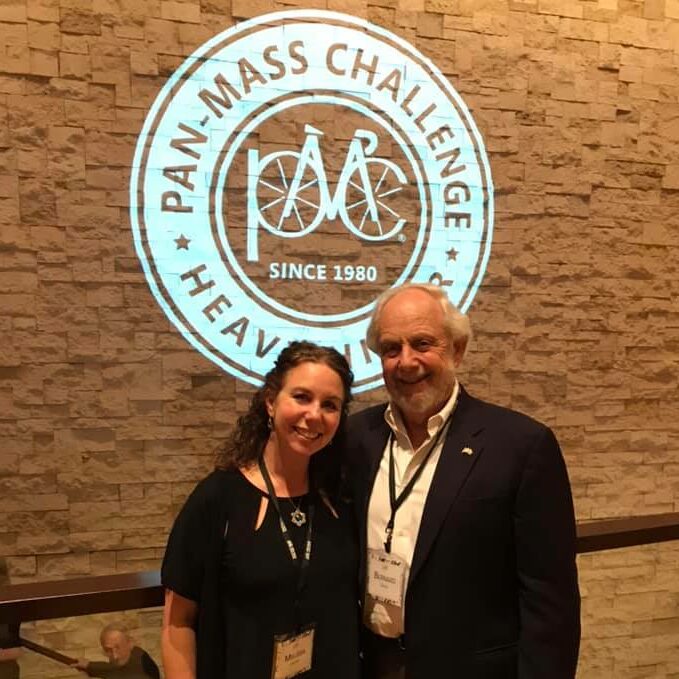"WE'RE CERTAINLY MAKING LEMONADE OUT OF LEMONS"
- Levy Coleman, Perry's father
Shortly after Perry's death the families established the Perry S. Levy Fund for Gastrointestinal Cancer Research at Dana Farber Cancer Institute.
Due to the amount raised by Team Perry, we have the proud honor of appointing a Fellow at the Gastrointestinal Cancer Center (GCC) at Dana Farber.
The team's fundraising supports the fellow's annual salary as well as research efforts at Dana Farber.
Pictured: Melissa Jacoby and her father, Buddy Gitlin who passed away on July 22, 2023 after a short battle with AML Leukemia, just 2 weeks before the PMC. Buddy was a founding member of the team, a 22-year rider who recruited countless team members and a passionate fundraiser who personally raised over $400,000.

Current Fellow
 2024: Rishi Surana, MD, PhD
2024: Rishi Surana, MD, PhD
Dr. Surana grew up in Lawrence, KS and received his B.S. in Microbiology from the
University of Michigan—Ann Arbor. After a year conducting research as a Pre-doctoral
Cancer Research Training Award (Pre-CRTA) recipient at the National Cancer Institute,
he attended Georgetown University where he received his M.D. and Ph.D degrees as a
member of the combined M.D./Ph.D program.
After medical school, Dr. Surana
completed his internship and residency in internal medicine at Oregon Health and
Science University and subsequently completed his hematology/oncology fellowship at
the University of Texas MD Anderson Cancer Center.
Dr. Surana joined the Gastrointestinal Cancer Center at the Dana-Farber Cancer Institutein 2022 as a medical oncologist and is also a member of the faculty at Harvard Medical School. Dr. Surana is an active clinical and translational researcher with a focus on understanding how the tumor microenvironment influences clinical outcomes and responses to various anti-cancer therapies. He sees patients with gastrointestinal cancers in his clinic and is involved in developing clinical trials to help improve upon and bring new therapies to our patients. Dr. Surana is also an active member of the Immune Effector Cell (IEC) program within Dana-Farber and works to bring novel cellular-therapy based clinical trials to patients with gastrointestinal malignancies.
In his spare time, Dr. Surana enjoys traveling, spending time with friends and family and rooting for his favorite sports teams.
Research News
- 2020 Progress Report (2020)
- Prediagnosis Use of Statins Associates With Increased Survival Times of Patients With Pancreatic Cancer (2018)
- Cigarette Smoking and Survival in Pancreatic Cancer (2017)
- Genomic makeup of colorectal cancers predicts immune system ability to fight tumors (2016)
- Higher Coffee Intake Associated With Significantly Reduced Cancer Recurrence and Increased Survival in Patients With Late-Stage Colon Cancer (2015)
- Researchers identify early sign of pancreatic cancer (2014)
- Boost in Plasma Levels of Chain Amino Acids Is Associated With Increased Risk of Pancreatic Cancer (2014)
Past Fellows
2023: Brandon Huffman, MD
 Dr. Huffman is a midwestern transplant to the northeast. He grew up in Missouri where he received his B.S. in biochemistry from the University of Missouri and MD from the University of Missouri School of Medicine in Columbia, Missouri. He spent an extra year between his second and third year of medical school studying pathology as a post-sophomore fellow at the University of Missouri. After graduation from medical school, he completed a residency in Internal Medicine at the Mayo Clinic in Rochester, Minnesota where he spent an additional year as a chief medical resident. He completed a Medical Oncology fellowship at the Dana-Farber Cancer Institute where he also served as a chief fellow. In 2023, Dr. Huffman became a medical oncologist in the Gastrointestinal Cancer Center at Dana-Farber Cancer Institute and a member of the faculty at Harvard Medical School.
Dr. Huffman is a midwestern transplant to the northeast. He grew up in Missouri where he received his B.S. in biochemistry from the University of Missouri and MD from the University of Missouri School of Medicine in Columbia, Missouri. He spent an extra year between his second and third year of medical school studying pathology as a post-sophomore fellow at the University of Missouri. After graduation from medical school, he completed a residency in Internal Medicine at the Mayo Clinic in Rochester, Minnesota where he spent an additional year as a chief medical resident. He completed a Medical Oncology fellowship at the Dana-Farber Cancer Institute where he also served as a chief fellow. In 2023, Dr. Huffman became a medical oncologist in the Gastrointestinal Cancer Center at Dana-Farber Cancer Institute and a member of the faculty at Harvard Medical School.
Dr. Huffman is a clinical investigator and translational researcher who is focused on bringing preclinical research ideas into clinic by designing and conducting innovative clinical trials for patients with gastrointestinal cancers. In the clinic, Dr. Huffman sees patients with all types of gastrointestinal cancers, and he is deeply invested in their ongoing care.
Dr. Huffman is married to his college sweetheart; they have an elementary-aged son. He enjoys spending time with his family at local parks, sports venues, and museums, traveling, and exploring his local community.
2022: Harshabad (Harsh) Singh, MBBS

Dr. Singh is a medical oncologist who specializes in the treatment of gastrointestinal tract cancers and is faculty at Dana-Farber Cancer Institute, Brigham and Women’s Hospital, and Harvard Medical School. He received his medical doctorate, first in his class, from the Government Medical College and Hospital in Chandigarh India. He completed his internal medicine residency and chief residency at Massachusetts General Hospital and fellowship in medical oncology at Dana-Farber Cancer Institute. Subsequently, he pursued postdoctoral training in cancer epigenetics in the laboratory of Dr. Shivdasani at Dana-Farber.
Dr. Singh is a translational researcher who is focused on using his basic science training and expertise to bring novel therapies from the bench to the clinic for his patients. Outside of work, Harsh loves watching and playing cricket and spending time with his wife and two sons.
2021: William Freed-Pastor, M.D., Ph.D.
Instructor of Medicine, Dana-Farber Cancer Institute
Post-Doctoral Research Fellow, Koch Institute, Massachusetts Institute of Technology
Dr. Freed-Pastor is an Instructor of Medicine at the Dana-Farber Cancer Institute specializing in gastrointestinal oncology and a post-doctoral research fellow in the laboratory of Tyler Jacks at the Koch Institute for Integrative Cancer Research at MIT, one of the Lustgarten Foundation dedicated pancreatic cancer research laboratories. He is a compassionate clinician, innovative researcher, and dedicated teacher and mentor.
2020: Kelly Burke, MD, PhD

Kelly Burke, MD, PhD is an outstanding physician-scientist working to harness the immune system to attack gastrointestinal cancers.
Born in South Korea and raised in Minnesota, Kelly attended Kenyon College where she majored in chemistry. She attended Johns Hopkins School of Medicine where she earned her MD and PhD in Immunology. She completed her residency in Internal Medicine at the Massachusetts General Hospital and is currently a hematology/oncology fellow at the Dana Farber Cancer Institute/Partners Cancer Care Program.
Kelly is conducting her post-doctoral research in the lab of Arlene Sharpe, a noted T cell immunologist at Harvard Medical School, where she uses mouse models to study mechanisms of immunotherapy and ways to develop long-lived durable immune responses against cancer.
Outside of work, she loves running, traveling, eating good food, and spending time with her husband and infant son.
2019: Nilay Sethi, MD, PhD
- Sethi received his medical degree from Rutgers Robert Wood Johnson Medical School and his PhD from Princeton University.
- Sethi works in the Gastrointestinal Cancer Center led by Brian Wolpin (former Team Perry fellow) at the Dana-Farber Cancer Institute, where he splits his time between taking care of patients with gastrointestinal cancers in the clinic and investigating a subset of these cancers in the laboratory of Adam Bass.
- He is particularly focused on better characterizing how early genetic mistakes engage inflammation during the initiation of these cancers. After developing a novel mouse model of gastric cancer, he recently found that mutations found early in stomach cancer progression can promote inflammation, which has implications for anti-inflammatory agents as a potential preventative strategy. By leveraging data from patients, mouse models, and cell culture studies, he is motivated to provide an integrated understanding of early events in gastrointestinal cancers with the ultimate hope that the knowledge gained will inspire new avenues for cancer prevention and treatment.
2017 – 2018: Srivatsan Raghavan, MD, PhD
- Raghavan obtained his undergraduate and master's degrees in chemical engineering at MIT. After working in industry for several years, he joined the MD/PhD program at Johns Hopkins University, where he completed medical school and pursued his PhD in biomedical engineering. His thesis work focused on using micro-engineering approaches to control the cellular microenvironment in order to examine cellular processes such as migration and angiogenesis. He then completed his internal medicine residency training at Johns Hopkins Hospital before joining the oncology fellowship program at Dana-Farber.
- Raghavan works closely with Brian Wolpin and Andy Aguirre (both former Team Perry fellows) to grow patients' tumor cells obtained from surgeries or biopsies in the lab as "tumor organoids". He then performs drug testing on these organoids using different compounds that are available in the clinic, with the goal of identifying the therapies that might work best for each specific patient.
- His focus thus far has been on pancreas and biliary cancers, two difficult-to-treat diseases with few treatment options beyond chemotherapy.
- He and his team are trying to perform drug testing in real-time (while patients are being treated with first-line chemotherapy) so that they can take any drug sensitivity information back to the treating clinician to potentially help guide subsequent treatment choices in a patient-specific manner. They are in the early phases of this and are very excited about this approach as it bridges the lab and clinical efforts, and they are hopeful that these kinds of approaches are the next step after tumor sequencing to make more precise and effective therapeutic choices for each patient.
2015 – 2016: Andrew Aguirre, MD, PhD
- Dr. Aguirre received his medical degree from Harvard Medical School and his PhD from Harvard Medical School and Massachusetts Institute of Technology before completing his internship, residency, and chief residency in Internal Medicine at Massachusetts General Hospital.
- He has been a clinical fellow in Hematology/Oncology at the Dana-Farber Cancer Institute/Partners Cancer Care Fellowship Program.
- Dr. Aguirre is currently working in the laboratory of Dr. William Hahn, studying the biology of gastrointestinal cancer, most notably pancreatic cancer. His major project is the development of novel treatments that target the KRAS oncogene – a gene which is mutated in 90% of pancreatic cancers and 40% of colorectal cancers.
2014: Marios Giannakis, MD, PhD
- Dr. Giannakis received his medical degree and his PhD from Washington University School of Medicine before completing his internship and residency in Internal Medicine at Brigham & Women’s Hospital.
- He has been a clinical fellow in Hematology/Oncology at the Dana-Farber Cancer Institute/Partners Cancer Care Fellowship Program.
- Highlights of Dr. Giannakis’ research:
- Discover of a new gene that drives colorectal cancer (RNF43); he is now leading a clinical trial of a novel drug that targets RNF43 for patients with advanced colorectal cancer.
- Discover of genes that affect the ability of colorectal cancer to evade the natural immune systems.
2012 – 2013: Douglas Rubinson, MD, PhD
- Dr. Rubinson received his medical degree from Harvard Medical School and his PhD from the Massachusetts Institute of Technology before completing his internship and residency in Internal Medicine at Brigham & Women’s Hospital.
- He has been a clinical fellow in Hematology/Oncology at the Dana-Farber Cancer Institute/Partners Cancer Care Fellowship Program.
- Highlights of Dr. Rubinson’s research:
- Discovering the key genetic events that drive the development and growth of pancreatic cancer.
- Identify new targets for therapy through a detailed a comprehensive genetic analysis of the tumors with pancreatic cancer.
2011: Mandar Deepak Muzumdar, MD
- Dr. Muzumdar received his medical degree from the Stanford University School of Medicine before completing his internship and residency in Internal Medicine at Brigham & Women’s Hospital.
- He has been a clinical fellow in Hematology/Oncology at the Dana-Farber Cancer Institute/Partners Cancer Care Fellowship Program.
- Highlights of Dr. Muzumdar’s research:
- Investigating the role of obesity and diabetes in pancreatic cancer development and the effect of the microenvironment in tumor formation in mouse models of pancreatic cancer
2010: Gabriela Motyckova, MD, PhD
- Motyckova received her medical degree from Harvard Medical School before completing her internship and residency at MGH.
- She served as a clinical fellow in the Hematology/Oncology at the Dana-Farber Cancer Institute/Partners Cancer Care Fellowship Program.
- Highlights of Dr. Motyckova’s research:
- Research projects that focus on understanding responses of older patients with AML to hypomethylating agents with a goal to develop clinical trials.
- Participating in developing a clinical center at DFCI for older leukemia patients; this referral center will provide comprehensive and multidisciplinary care to older patients with hematologic malignancies.
- With the help of geriatricians and medical specialists in areas such as nephrology, cardiology, psychiatry, neurology and palliative care, the center would strive to provide optimal care for older patients and develop new options for clinical trials.
2009: Andrea Myers, MD, PhD
- Dr. Myers received her medical degree and PhD from the Stanford University School of Medicine (2005) before completing her internship at MGH.
- She served as a clinical fellow at DFCI.
- Highlights of Dr. Myers’s research:
- Investigations of the different molecular changes that cause colorectal cancer tumor development and how they relate to prognosis and treatment.
2008: Kenneth May, Jr., MD, PhD
- Dr. May received his medical degree and PhD from the Ohio State University College of Medicine before completing his internship at BWH.
- He served as a clinical fellow at DFCI.
- Highlights of Dr. May’s research:
- Investigations of tumor immunity and the development of cancer vaccines.
2007: Rizwan Haq, MD, PhD
- Dr. Haq received his medical degree and PhD from the University of Toronto School of Medicine (2003) before completing his internship and residency in Internal Medicine at Johns Hopkins Hospital (JHH).
- Highlights of Dr. Haq’s research:
- Identifying new therapeutic targets for melanoma and development of novel therapies for its treatment
- Identifying new compounds promoting sunless tanning that could be used to reduce the risk of developing skin cancer
- Characterizing a novel regulator of cell death which may explain notorious resistance of melanoma to conventional chemotherapy
2006 – 2007: Kimmie Ng, MD, MPH
- Dr. Ng received her medical degree from the University of Pennsylvania School of Medicine (2001) before completing her residency in Internal Medicine at the University of California, San Francisco and her fellowship in Medical Oncology at DFCI. She obtained a Master’s in Public Health from the Harvard School of Public Health (2007).
- Highlights of Dr. Ng’s research:
- Discovering that colorectal cancer patients with higher levels vitamin D in their blood were more likely to survive following treatment than those who had lower levels of the vitamin.
- Identifying molecular predictors of survival in colorectal cancer patients and the development of novel therapies for the treatment of gastrointestinal malignancies.
2005: Brian Wolpin, MD, MPH
- Dr. Wolpin received his medical degree from HMS (2001) before completing his residency in Internal Medicine at BWH and his fellowship in Medical Oncology at DFCI. He obtained a Master’s in Public Health from the Harvard School of Public Health (2008).
- Highlights of Dr. Wolpin’s research:
- Discovering a link between pancreatic cancer risk and a specific protein affected by obesity, proving that that people with low blood levels of an insulin-like growth factor were twice as likely to develop pancreatic cancer compared to those with higher levels.
- Studying biomarkers and novel therapeutics in gastrointestinal malignancies, and mechanisms by which lifestyle factors interact with cancer risk and progression.
2004: Jennifer Chan, MD, MPH
- Dr. Chan received her medical degree from Harvard Medical School (HMS) (2000) before completing her residency in Internal Medicine at Brigham and Women's Hospital (BWH) and her fellowship in Medical Oncology at Dana-Farber Cancer Institute (DFCI). She obtained a Master’s in Public Health from the Harvard School of Public Health (2006).
- Highlights of Dr. Chan’s research:
- Investigating the role of estrogen in the development of new therapies for colon cancer, finding that postmenopausal women with colon cancer lived longer and were less likely to die of the disease if they had been taking estrogen supplements within five years of their diagnosis.
- Examining the genetic underpinnings of family history on colorectal cancer, discovering that a family history of colon or rectal cancer doubles one’s risk of the disease, but improves the odds of survival should the cancer develop.

